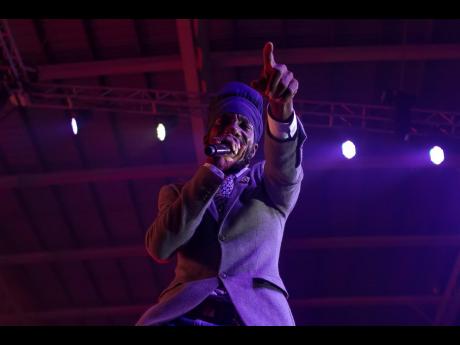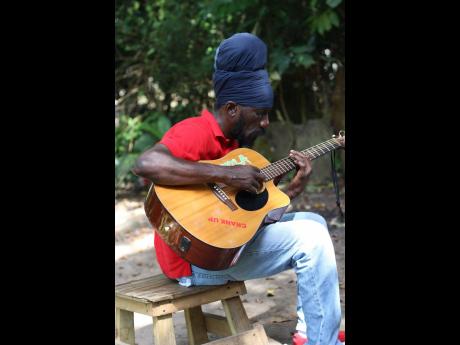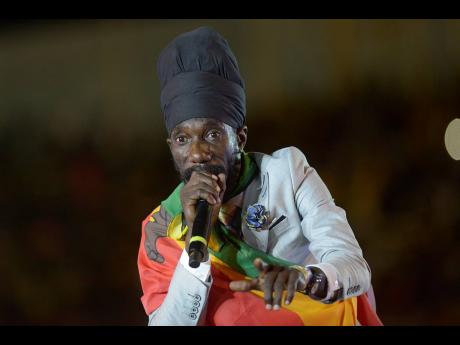Five Questions With Sizzla Kalonji
Making music for the masses is no difficult feat for Sizzla Kalonji. From his emergence on the reggae and dancehall scene in the ‘90s to now, he continues to exceed expectations. The lyrics, “Perseverance for the utmost best should be your preference, skills of trade and talents is your evidence. Help those who far off, teach those in your residence,” from his early-2000 hit Rise to the Occasion perhaps best epitomises his work as a recording artiste and humanitarian.
With a catalogue that transcends that of other artistes of his generation, it may be hard for any supporter to select one song – or even five songs – that stands out. But to what does the well-spoken and reserved lyricist owe his success? “Humility is the key, and in Jamaica, a country, a black nation, filled with proverbs and folklore sayings as well as Psalms and prayers, that’s the basic foundation for anyone being in this position. [For anyone] having the power of administering to the public. All what I asked the Most High for I think I have gotten it. The first thing is love and life, and I got life within me. So, that’s why I say it is best to be humble,” he told The Gleaner.
Sizzla’s latest albums are Victory and Million Times, the latter currently making an impact on the Latin market. Both add to a catalogue of over 80 albums, more than 20 of which have charted on Billboard. “It is a great feeling. I am honoured to be part of the industry where Bob Marley is the father, Peter Tosh, Ini Kamoze and Beres Hammond, all of them, contributing towards the whole industry with music, albums and performances,” he said. Speaking of performances, Sizzla is booked to hit the virtual stage for the Jamaica Rum Festival presented by Appleton Estate on March 27. See what keeps Sizzla going in this week’s Five Questions With.
1. Is there any industry outside of entertainment that you feel we need to invest more resources in and make changes to?
We need to be doing everything because our foreparents, our ancestors, did everything … that’s why we are here because of their righteousness. When it comes on to things like farming, we should not hesitate because we are the ones who have been on the plantations; we know about farming. So, when people say we need to go farm because there is a pandemic, that shouldn’t be new to us. But our foremost duty, because the first thing in the creed is, ‘Let the hungry be fed, the naked clothed …’ – we need to do what will bring about stability for a nation.
2. If you were the prime minister of Jamaica for a day, what would you put in place?
It would just be the original Ancient Order of the Most High, His Imperial Majesty, the Conquering Lion of the Tribe of Judah. The precepts and principles that were all written on the scrolls that we’ve been following from that time to this time. I would just replace the Ancient Order of the Almighty, and the people would have to be living in love and respect themselves – just focus on reminding people of their true self.
3. What drives you? Why do you continue to do what you do in the industry and at the community level?
I have seen persons in a very deplorable state of suffering, in the ghetto facing a lot of turmoil, the destructive approach from governments and even their fellow brothers and sisters, and I have seen, too, where music elevated them to great musicians and artistes. And if I am to be part of the class, like in a school, I have to make the teacher proud. The same principles apply to the music. I have to make any person who come before us in the music proud of me, as part of the new generation in the continuation of the duty. There’s nothing else to it; it’s just natural like another subject.
4. Has the inspiration to record new music and create albums changed since your first album Burning Up was released over two decades ago?
No, it hasn’t changed; the inspiration is still the same. Music is mathematics. A very common saying in Jamaica is, ‘Do the maths’, so what we don’t know [is that] our first language is mathematics. While words can lead you astray, or people can lure you in a different pathway, with maths, you have to be precise; you have to do the formula to solve the equation to get the solution. That is what it is for me. I’m doing the work and keeping it simple so even young children can understand what is going on through the music.
5. From your music, people will see that women are one of your inspirations. With International Women’s Day approaching, is there any woman in the music industry you feel we need to highlight?
For me, March is Women’s Month, so I have to start with all the mothers. Without mothers, you wouldn’t have all the musicians and artistes that are around doing beautiful work. I can’t just choose one woman, all the women, they play a part, but me still have to call on mama Rita Marley. Then, from me say her name, me have to mention Judy Mowatt, Marcia Griffiths, Carlene Davis and Lady Saw, and so many others. So, all the ladies, please be blessed.



